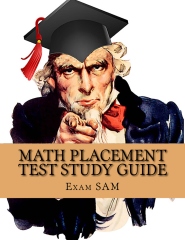Simplifying Radical Expressions – Examples Page
You will need to understand the process of simplifying radical expressions and study some examples for your algebra exam.
In particular, you will need to know how to factor radicals, how to perform operations such as addition and multiplication on radicals, and how to express radicals as rational numbers.
Simplifying Radical Expressions – Exercises
1) Factor: \(\sqrt{98}\)2) Simplify: \(\sqrt{20} + 2\sqrt{45} + 4\sqrt{180}\)
3) Simplify: \(\sqrt{28} + 5\sqrt{63} + 4\sqrt{112}\)
4) Simplify: \(\sqrt{7} \times \sqrt{13}\)
5) \(\sqrt[3]{\frac{216}{343}} = ?\)
Radicals – Answers
1) The correct answer is: \(7\sqrt{2}\)\(\sqrt{98} = \sqrt{49 \times 2} = \sqrt{49} \times \sqrt{2} =7\sqrt{2}\)
2) The correct answer is: \(32\sqrt{5}\)
\(\sqrt{20} + 2\sqrt{45} + 4\sqrt{180} =\)
\(\sqrt{4 \times 5} + (2\sqrt{9 \times 5}) + (4\sqrt{36 \times 5}) =\)
\(2\sqrt{5} + (2 \times 3\sqrt{5}) + (4 \times 6\sqrt{5}) =\)
\(2\sqrt{5} + 6\sqrt{5} + 24\sqrt{5} =\)
\(32\sqrt{5}\)
3) The correct answer is: \(33\sqrt{7}\)
\(\sqrt{28} + 5\sqrt{63} + 4\sqrt{112} =\)
\(\sqrt{4 \times 7} + (5\sqrt{9 \times 7}) + (4\sqrt{16 \times 7}) =\)
\(2\sqrt{7} + (5 \times 3\sqrt{7}) + (4 \times 4\sqrt{7}) =\)
\(2\sqrt{7} + 15\sqrt{7} + 16\sqrt{7} =\)
\(33\sqrt{7}\)
4) The correct answer is: \(\sqrt{91}\)
\(\sqrt{7} \times \sqrt{13} =\)
\(\sqrt{7 \times 13} =\)
\(\sqrt{91}\)
5) The correct answer is: \(\frac{6}{7}\)
\(\sqrt[3]{\frac{216}{343}} = \)
\(\sqrt[3]{\frac{6 \times 6 \times 6}{7 \times 7 \times 7}} = \)
\(\frac{6}{7}\)
Factoring Radicals
When you simplify radical expressions, you need to find the factors of each of the radicals in the expression first.
Simplifying Radical Expressions Examples – 1
Which of the answers below is equal to \(\sqrt{192}?\)
A. 1 ÷ 192
B. \(\text 3\sqrt{64}\)
C. \(\text 64\sqrt{3}\)
D. \(\text 8\sqrt{3}\)
E. \(\text 3\sqrt{8}\)
Answer: The correct answer is D
For radical problems like this one, you need to remember certain mathematical principles.
To start with, remember to factor the number inside the radical sign.
The factors of 192 are:
1 × 192 = 192
2 × 96 = 192
3 × 64 = 192
4 × 48 = 192
6 × 32 = 192
8 × 24 = 192
Then look to see if any of these factors are perfect squares.
In this case, the largest factor that is a perfect square is 64.
Now find the square root of 64.
\(\sqrt{64} = 8\)
Finally, you need to put this number at the front of the radical sign and put the other factor inside the radical sign in order to solve the problem.
\(\sqrt{192} = \sqrt{64} \times \sqrt{3} =\text 8\sqrt{3}\)
Simplifying Radical Expressions – Advanced Examples
Your exam may have advanced problems on simplifying radical expressions involving other operations, such as addition or subtraction.
Example 2:
\(\sqrt{32} + 2\sqrt{50} + 3\sqrt{18} = ?\)
A. \(5\sqrt{100}\)
B. \(6\sqrt{100}\)
C. \(30\sqrt{4}\)
D. \(2\sqrt{23}\)
E. \(23\sqrt{2}\)
Answer:
The correct answer is E
The first step is to find the factors of the amounts inside the radical signs.
Then look to see if any of these factors are perfect squares.
\(\sqrt{32} = \sqrt{16} \times \sqrt{2}\)
\(\text2\sqrt{50} = \text 2 \times \sqrt{25} \times \sqrt{2}\)
\(\text3\sqrt{18} = \text 3 \times \sqrt{9} \times \sqrt{2}\)
Then simplify the factors that are perfect squares and add up.
\(\sqrt{32} + 2\sqrt{50} + 3\sqrt{18} = \)
\((\sqrt{16} \times \sqrt{2}) + (\text 2 \times \sqrt{25} \times \sqrt{2}) + (\text 3 \times \sqrt{9} \times \sqrt{2}) = \)
\((4 \times \sqrt{2}) + (\text 2 \times 5 \times \sqrt{2}) + (\text 3 \times 3 \times \sqrt{2}) = \)
\((4\sqrt{2}) + (10\sqrt{2}) + (9\sqrt{2}) = \)
\((4 + 10 + 9) \times \sqrt{2} = 23\sqrt{2}\)
Multiplication of Radicals
Simplifying Radical Expressions Example 3:
\(\sqrt{3} \times \sqrt{5} = ?\)
A. \(\sqrt{15}\)
B. \(\sqrt{8}\)
C. \(3\sqrt{5}\)
D. \(5\sqrt{3}\)
E. \(\sqrt{-1}\)
Answer: The correct answer is A
Multiply the numbers inside the radical signs.
Then put this result inside a radical symbol for your answer.
\(\sqrt{3} \times \sqrt{5} = \sqrt{3 \times 5} = \sqrt{15}\)
Rationalizing Radicals
You may see problems on the exam that ask you to rationalize a number or to express a radical number as a rational number.
Simplifying Radical Expressions – Examples 4
Express the following as a rational number:
\(\sqrt[3]{\frac{64}{125}} = ?\)
A. \(\frac{1}{5}\)
B. \(\frac{4}{5}\)
C. \(\frac{5}{4}\)
D. \(\frac{64}{125}\)
E. \(\frac{125}{64}\)
Answer:
The correct answer is B
In this problem, you have to find the cube roots of the numerator and denominator in order to eliminate the radical.
\(\sqrt[3]{\frac{62}{125}} = \sqrt[3]{\frac{4 \times 4 \times 4}{5 \times 5 \times 5}}= \frac{4}{5}\)
Further Algebra Practice
You may also want to see out posts on:
